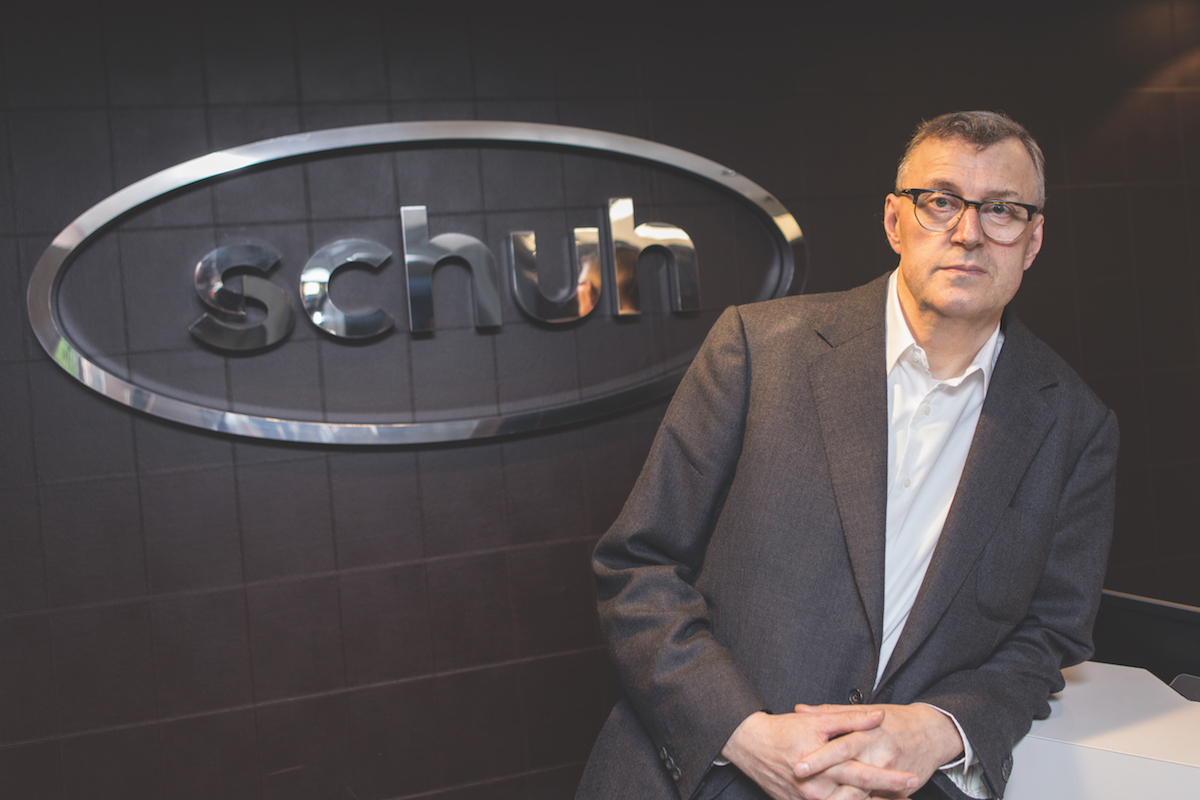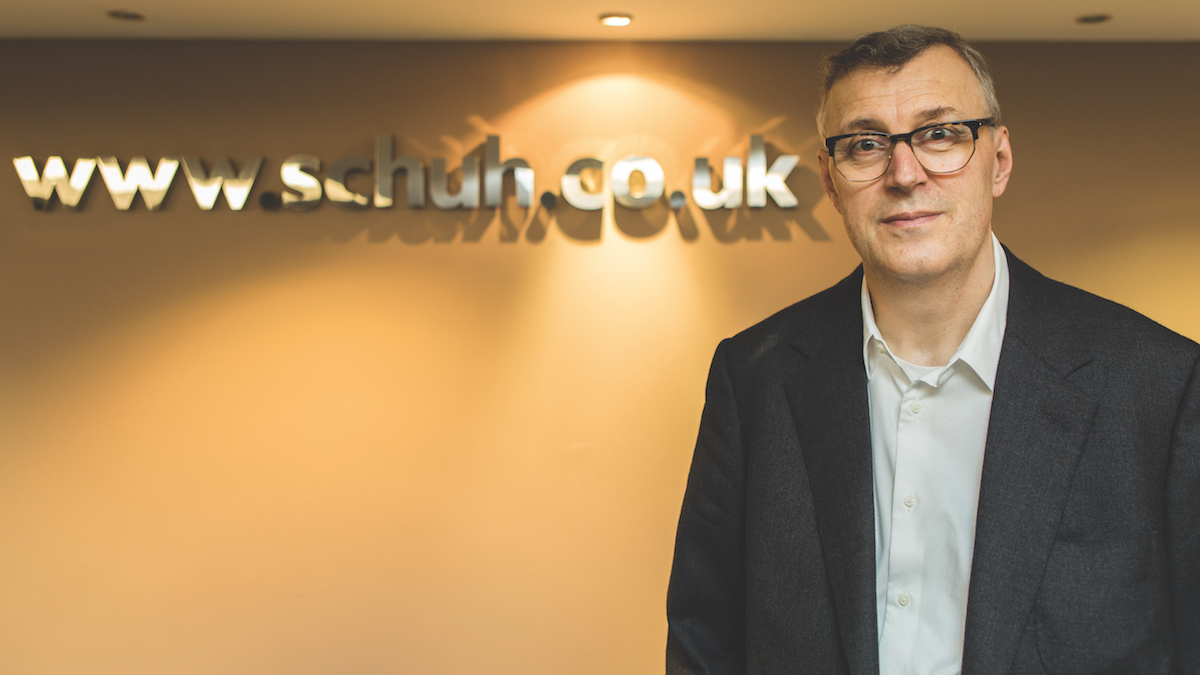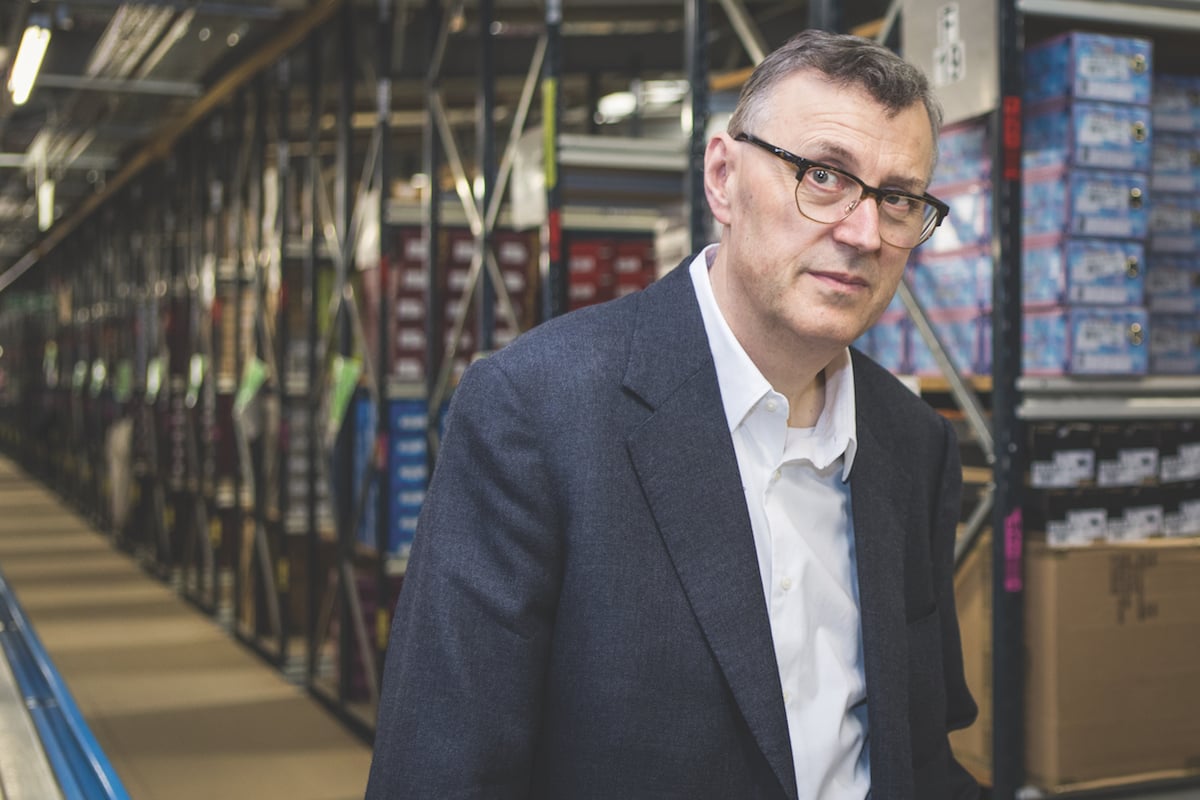A strange thing happens after talking to schuh Managing Director Colin Temple: you find yourself wondering what it would be like to be one of his employees, before surreptitiously checking out his company’s job opportunities online. It’s not just that he’s continuously voted as one of the UK’s best bosses, or that schuh is constantly rated as one of the ideal places in the UK to work — it’s also that he makes you feel like his is a rare place where potential is recognised and valued. In the world of retail, where managers are often criticised for paying more attention to sales than their most precious commodity, their staff, schuh’s philosophy seems as rare as a ray of sunshine on an English winter’s day.
So how did this former butcher boy from the north of England find himself presiding over a highly successful footwear retail giant and being voted Mr Popular by his staff? He’ll try and tell you it’s because he’s ‘lazy’, but that’s clearly not true as he’s well-known for his early starts and is usually in the office by 5.30 am. However, if by ‘lazy’ he means allowing his employees to work autonomously, then bring on lazy bosses. “What I do is let people get on and do their jobs. We employ just over 4,000 young, eager people and it would be disrespectful to micromanage them, especially as they’re so much better at their jobs than I am,” he grins.
Colin is also big on encouraging staff to look ahead and up. “We really like to promote people from within. We have 128 stores, and 125 are managed by people who’ve risen through the ranks. They started as part-timers when they were students, and ended up working full time and being put on our management trainee scheme.” He jokes that seeing your managing director working hard all day does nothing but extinguish ambition. “However, if you saw that your managing director was this lazy guy who took life easy, how motivational would that be for you to get to the top?”

“I let people get on and do their jobs … it would be disrespectful of me to micromanage them, especially as they’re so much better at their jobs than I am.”
Of course, there are obvious reasons why young people are attracted to schuh and why schuh, in turn, attracts the best of them. For a start, it pays well. All sales assistants receive the same hourly rate, which is significantly higher than the minimum wage, regardless of age, so instantly it pulls in the brightest kids. It’s clearly a stable staff as well as a youthful one. “I’ve got a management team of 7, and the newest recruit has been with me for 14 years and the oldest for about 21, so they’re a very established team but still relatively young. I’m 54 and by far the oldest person in the business. If I were to leave, the average age would probably drop to around 18!” Colin laughs.
In all seriousness, though, the average schuh employee age is quite young at 24, dropping to 21 in the physical stores. These motivated young people rave about the company and the way they’re given the responsibility and autonomy to run their store as they see fit, keeping staff and customers happy, making the place look good, and ensuring the best sellers are in the right place at the right times. They know, too, that their efforts will be noticed right at the top. When Colin visits his stores, which he regularly does, he chats to every member of staff to get a sense of how they feel about the business. “Being approachable to everyone in your business is extremely important,” he says. “There are no airs and graces with me. I didn’t work my way through the business by relying on my charisma or my dashing good looks. It really is just a question of being able to talk to everyone and honestly listen to them. Good people are an asset and bring great value to a business.”

Colin is obviously not the first great leader to put so much stock in his people, but he has introduced some other unique initiatives to constantly remind them of how sincerely they are valued. When the company has good profits and beats its budgets, for instance, bonuses are distributed in an unusually egalitarian way, with Colin receiving the same salary percentage as everyone else. “We’ve always had the mantra that if the business does well, everyone does well.”
Even more inclusive is the approach to community contributions. The company aims to give away around £500,000 a year and chooses causes that are close to the hearts of its staff members. He’s appointed a trust — a mix of staff and ex-directors — to make these choices. “So our staff apply to the trust; I don’t decide,” he explains. Donations can be wide and varied. A staff member might have a brother who is extremely ill or disabled and needs a downstairs bathroom put in his house, for instance, and the trust will pay for that. Alternatively, someone’s mum may have died of cancer, so the trust makes a donation to cancer research. It means that everyone knows about the company’s altruistic arm, and may even know someone who has directly benefited. It’s all very feel-good.
Of course, there’s no point having happy staff if you don’t have happy customers, and schuh is passionate about doing a good job in that regard as well. “People shop in 2 ways,” Colin explains. “There’s the ‘want’ business and the ‘need’ business. The need business is day-to-day groceries, like milk or eggs. We’re in the ‘want’ business — the fun part. When people buy shoes, it’s not because they don’t have any, or their old ones are broken; it’s because they want to buy new shoes. It’s a bit of escapism. People come to us because they want to and they like the environment.”
Schuh is also highly successful in the online arena (even though Colin only launched it to prove you can’t sell shoes online and was delighted to discover he was wrong!). Around a third of the company’s customers make purchases instore, a third online, and a third do both. However, online has changed the way all successful retailers do business.

“We’ve always had the mantra that if the business does well, everyone does well.”
“When I joined schuh in the 80s, the customer was only interested in a particular look or style — whether that was a hiking boot or a stiletto, round toes or pointy ones — but we started to do really well when people wanted brands. For a while they were quite content with this, and then 5 or 6 years ago, they got more sophisticated again. So it wasn’t just the brand, it was the silhouette, the pattern and the colour,” says Colin. “What’s different is that they want it now, and we have to keep up with that demand because in a few days’ time they may not want it at all. Amazon is changing everything when it comes to selling product. It’s raising the bar with regard to customer expectations, so you no longer have to wait 2 or 3 days for delivery, and now everyone else has to build infrastructure that allows them to do that as well.”
There are other ways that schuh meets that demand for instant gratification in its stores. It used to be that customers would ask to try on a shoe in their size and of a certain colour, and then sit and wait while the assistant disappeared into the stockroom. In schuh, assistants can check a device to tell them if the shoe is in stock while remaining with the customer. “If, for instance, it isn’t there in black, they can say, ‘But we do have it in brown, so if you try it on we can deliver it free to your work or home in the next 2 days.’ We’re giving customers great service as quickly as we can, and it makes commercial sense as well.”
Schuh has also dispensed with cash registers in its newest outlets. Instead, customers can pay by card while sitting and fastening their shoes, just as you’d remain at your table while sitting in a restaurant. It means customers are in and out much faster. “Retail is all about little victories. If I can save a couple of seconds here and there, it might mean one extra sale a day in a store. And if I can get one extra pair of shoes a day out of a store, multiply that by 128 stores and the 363 days that we trade, and then times that by the average £50 selling price, and that amounts to more than £2 million,” explains Colin. “So we really do try to lever technology to help us be an efficient retailer and engage with the customer so we’re not frustrating them. We don’t want to rush you through the store, but we do want to make it efficient, and we want to make the nice bits — like selection and customer service — as pleasant as possible.”

Colin admits it’s easy to get “snowblinded by technology and to keep jumping from the latest thing to the next.” His approach is to first make sense of it, and he does that by thinking of it in terms of the customer journey. Online, that means monitoring everything from how quickly a credit card is processed to how long delivery takes. In bricks-and-mortar stores, it means technology being used to constantly check stock and what’s moving and what they need more of.
Schuh’s target demographic is 16–24-year-olds. The company’s 392,000 Facebook followers lust after every new style that pops up complete with pithy caption. Colin constantly talks about waiting for things to “mature”, whether that be a brand, a store, or a promising employee, but there’s a sense this term applies to customers as well.
Four years ago, schuh set up standalone children’s stores, establishing early loyalty that will hopefully stand them in good stead in the future. They now have 12.
Clearly there are other opportunities for expansion as well. Being a Scottish-based company, the brand is still maturing in the country’s capital, with 7 stores and another planned on London’s Tottenham Court Road — just off shopping mecca Oxford Street. It has also just opened 3 stores in Germany. “We’ve got a high street store, a shopping centre store, and an out-of-town shopping mall store, and what we’re doing is letting those stores mature and that’s a great opportunity for us. We need to know what our point of difference is because, of course, there are shoe shops everywhere in the world and brands are pretty global, but we very much trade on service. We’re a branding umbrella, so we stock around 94 brands and try to be a curator for our customers, so hopefully we have a bit of street cred.”
One thing schuh doesn’t do is discount — well, not unless they’re housekeeping and clearing out old stock to make room for new. This means that Colin has to remain sensitive to the fact that if he’s selling brands that other retailers are selling, he has to offer them at a similar price. “We have no price elasticity, so instead we have to offer service and the confidence that if you buy from schuh, it’s been curated and it’s credible.” Having said that, it’s clear Colin doesn’t simply regard other fashion or shoe retailers as his competition. “If you go back to our mantra that we are in the ‘want’ business, then our competition is anyone who is going for our target demographic and their free spend, so that could be T in the Park, restaurants, cinema, Apple watches or games. Our competition is everyone going for that free spend,so we have to give people what they want, when they want it, seamlessly.”
Clearly Colin isn’t remotely lazy. He’s been with schuh since the late 80s, joining after 2 years in a butcher’s shop and then a spell with Woolworths where he earned a place on its management-trainee scheme.
His initial reason for joining schuh was the fact he’d worked his way up through Woolworths to become a merchandiser and had been moved to their head office in London. He was courting his now wife, Sandra, at the time and wanted to settle down, but house prices in the capital were beyond him. He spotted schuh on his regular trips up to Edinburgh — where he would give evidence in court in the shoplifting cases that were plaguing Woolworths at the time — and applied for a job as gents’ merchandiser. Soon after, schuh was bought out by Goldbergs and amassed 34 stores before going into administration in 1990. It was at this point that Colin found himself a junior member of a team conducting its own buyout in order to save the company.
A small equity in the business provided an extra incentive to stay on, and he continued to work his way up the ladder, becoming managing director in 2004. In 2010, there was a secondary buyout before being bought out himself by US retail corporation Genesco at the beginning of 2011. That was the move that, using the maturing analogy again, allowed schuh to grow from a young adult into a fully grown and very competent one. Under Genesco, schuh has massively expanded the business, doubling the number of stores as well as generating that healthy online income.
So enough of the lazy, please, Colin? “Okay, I’ve really got 3 jobs,” he finally admits. “One is managing my management team and, because I know I’m useless, I have to make sure the succession plan is such that if one of them is knocked down by a number 12 bus, someone else can do the job because I know I can’t do it. There are advantages in having an incompetent Managing Director because you know you’ve got to cover all areas.“The second part of my job is strategic thinking, because I’ve got to figure out where the business is going to be in the next 3 to 5 years. I look at the fact that Amazon is opening stores and you’ll walk in and they’ll know who you are. And the implications for shopping centres with driverless cars and the whole delivery system — I’ve got to be abreast of all that and constantly thinking about strategy.
“My third role is what I call my mayoral role. It really is a bit like being a mayor. We’re not a signature business; we’re a fashion business. I go out and represent the business, our little community within the brands and within the trade. I interact with the Americans, and have a duty of care to our people. The way I describe our business is “People, Products and Processes”. Look after People – your staff and customers, and have great buying teams that can curate the Product, work the brands, spot new trends, and get a sense of when brands are reaching maturity. Then Processes are things like technology, real-time stock, and having an IT structure. If you get all those 3 Ps right, you get what I call the ‘silent P’, which is Profit.
“So it’s a nice job. I manage the company, look to the future, and I’m an ambassador for the business. Of course, it can have its downsides. The retail business has had a bit of bad press, and there have been a lot of things happening with companies closing and pensions disappearing, and bad reports of how companies treat their staff. But, by and large, staff and consumers are a delight. It’s a fantastic place to do business, and it’s an excellent career for people, even though it’s not always seen that way. So I want to give a thumbs-up and a bright smile for retailing!”
And there’s no better man to do this.


Great article. Well done Colin
Great article. Well done Colin